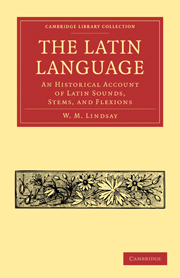Book contents
- Frontmatter
- PREFACE
- Contents
- LIST OF ABBREVIATIONS
- CHAPTER I THE ALPHABET
- CHAPTER II PRONUNCIATION
- CHAPTER III ACCENTUATION
- CHAPTER IV THE LATIN REPRESENTATIVES OF THE INDO-EUROPEAN SOUNDS
- CHAPTER V FORMATION OF NOUN AND ADJECTIVE STEMS
- CHAPTER VI DECLENSION OF NOUNS AND ADJECTIVES. COMPARISON OF ADJECTIVES. NUMERALS
- CHAPTER VII THE PRONOUNS
- CHAPTER VIII THE VERB
- CHAPTER IX ADVERBS AND PREPOSITIONS
- CHAPTER X CONJUNCTIONS AND INTERJECTIONS
- INDEX
- ADDENDA ET CORRIGENDA
CHAPTER I - THE ALPHABET
Published online by Cambridge University Press: 05 August 2011
- Frontmatter
- PREFACE
- Contents
- LIST OF ABBREVIATIONS
- CHAPTER I THE ALPHABET
- CHAPTER II PRONUNCIATION
- CHAPTER III ACCENTUATION
- CHAPTER IV THE LATIN REPRESENTATIVES OF THE INDO-EUROPEAN SOUNDS
- CHAPTER V FORMATION OF NOUN AND ADJECTIVE STEMS
- CHAPTER VI DECLENSION OF NOUNS AND ADJECTIVES. COMPARISON OF ADJECTIVES. NUMERALS
- CHAPTER VII THE PRONOUNS
- CHAPTER VIII THE VERB
- CHAPTER IX ADVERBS AND PREPOSITIONS
- CHAPTER X CONJUNCTIONS AND INTERJECTIONS
- INDEX
- ADDENDA ET CORRIGENDA
Summary
If an alphabet is to express the sounds of a language properly, each nation must construct one for itself. But this ideal was not realized by the ancient languages of Italy. The Oscan and Umbrian stocks borrowed for the expression of their language the alphabet used by the Etruscans, who had themselves borrowed it at an earlier period from the Greeks; and so neither Oscans nor Umbrians were at first able to express in writing some common sounds of their language, such as d and o, which were wanting in the Etruscan speech (von Planta, Osk.-Umbr. Dial. i., p. 44). The Latin Alphabet, consisting in the later Republic of twenty-one letters, ABCDEFGHIKLMNOPQRSTVX, was borrowed from some Chalcidian colony (e.g. Cumae), to judge from the form of the letters, which more nearly resemble those of the Chalcidian inscriptions than of any other Greek stock. So few Latin inscriptions earlier than the second Punic War have been preserved, that it is difficult to trace each separate stage in the process of adapting the Greek alphabet to the exigencies of the Latin language.
- Type
- Chapter
- Information
- The Latin LanguageAn Historical Account of Latin Sounds, Stems, and Flexions, pp. 1 - 12Publisher: Cambridge University PressPrint publication year: 2010First published in: 1894



